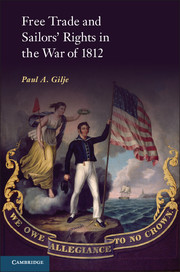Part Three - Origins
Published online by Cambridge University Press: 05 March 2013
Summary
Origins
By the inauguration of Thomas Jefferson on March 4, 1801, the two elements of Porter's motto – free trade and sailors’ rights – had become entrenched in American political and popular culture. Although they were sometimes mentioned in close proximity to each other, they had not yet become connected. If both ideas were important in American relations with Great Britain, France, and even the Barbary states, they remained distinct and different concepts. During the decade after Jefferson's revolution of 1800 they would gradually merge, although Jefferson and James Madison were often more concerned with the patrician free trade, especially as it related to neutral rights, while common folk, newspaper editors, and even many Republican politicians focused more on the plebeian sailors’ rights. As the United States moved toward war with Great Britain, other issues also intruded, so that by the eve of the War of 1812 Americans had multiple reasons to fight the British. Not only were they concerned with neutral commerce and the question of impressment, they were also interested in expanding the republic and ending the Native American presence east of the Mississippi. To understand how and why free trade and sailors’ rights were brought together and became the rhetorical explanation for the conflict, we need to examine those other reasons and then trace the story of free trade and sailors’ rights individually from 1801 to the outbreak of the war. In the end, free trade and sailors’ rights combined with each other and with the other causes of the War of 1812 to convince many Americans that they had to protect the honor of the nation in a world where monarchs competed for empire and scoffed at the idea that a government based on republicanism should be taken seriously.
- Type
- Chapter
- Information
- Free Trade and Sailors' Rights in the War of 1812 , pp. 125 - 126Publisher: Cambridge University PressPrint publication year: 2013



